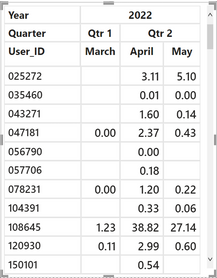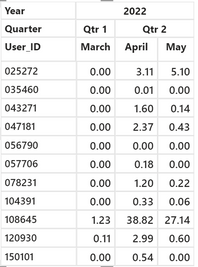- Power BI forums
- Updates
- News & Announcements
- Get Help with Power BI
- Desktop
- Service
- Report Server
- Power Query
- Mobile Apps
- Developer
- DAX Commands and Tips
- Custom Visuals Development Discussion
- Health and Life Sciences
- Power BI Spanish forums
- Translated Spanish Desktop
- Power Platform Integration - Better Together!
- Power Platform Integrations (Read-only)
- Power Platform and Dynamics 365 Integrations (Read-only)
- Training and Consulting
- Instructor Led Training
- Dashboard in a Day for Women, by Women
- Galleries
- Community Connections & How-To Videos
- COVID-19 Data Stories Gallery
- Themes Gallery
- Data Stories Gallery
- R Script Showcase
- Webinars and Video Gallery
- Quick Measures Gallery
- 2021 MSBizAppsSummit Gallery
- 2020 MSBizAppsSummit Gallery
- 2019 MSBizAppsSummit Gallery
- Events
- Ideas
- Custom Visuals Ideas
- Issues
- Issues
- Events
- Upcoming Events
- Community Blog
- Power BI Community Blog
- Custom Visuals Community Blog
- Community Support
- Community Accounts & Registration
- Using the Community
- Community Feedback
Register now to learn Fabric in free live sessions led by the best Microsoft experts. From Apr 16 to May 9, in English and Spanish.
- Power BI forums
- Forums
- Get Help with Power BI
- Desktop
- Showing null/blank values as 0 in matrix causing a...
- Subscribe to RSS Feed
- Mark Topic as New
- Mark Topic as Read
- Float this Topic for Current User
- Bookmark
- Subscribe
- Printer Friendly Page
- Mark as New
- Bookmark
- Subscribe
- Mute
- Subscribe to RSS Feed
- Permalink
- Report Inappropriate Content
Showing null/blank values as 0 in matrix causing all dates to show
Hi All,
I have a requirement to show the blank values in my matrix as 0 with my date in column shelf of matrix. But when I use my created measure in the matrix, it starts showing all the dates (which are not even part of my data).
I have tried various suggestions provided to use a different date table, link it with primary table and use it in the matrix. But I am still getting the same result (i.e. all months). Please help with your inputs or alternative suggestions. Below is my scenario in detail.
1) Original Output:
2) Created measure to show as 0:
3) Result with Sales_ZN measure: (showing all the months)
Getting the same output when creating a separate date table, linking it with original primary table and using the date field in matrix.
4) Expected Output:
Thanks!
Solved! Go to Solution.
- Mark as New
- Bookmark
- Subscribe
- Mute
- Subscribe to RSS Feed
- Permalink
- Report Inappropriate Content
Hi @Sm95 ,
Try this formula:
Sales_ZN =
IF (
ISBLANK (
CALCULATE (
MAX ( 'Table'[Sales] ),
ALLEXCEPT ( 'Table', 'Table'[Year], 'Table'[Month] )
)
),
BLANK (),
SUM ( 'Table'[Sales] ) + 0
)
Best Regards,
Jay
If this post helps, then please consider Accept it as the solution to help the other members find it.
- Mark as New
- Bookmark
- Subscribe
- Mute
- Subscribe to RSS Feed
- Permalink
- Report Inappropriate Content
Hi @v-jayw-msft ,
Thanks a lot for the suggestion. This is working as expected. Just a question, could you please explain why have you used MAX function in CALCULATE? I got the expected values using SUM as well, instead of MAX.
CALCULATE (
MAX ( 'Table'[Sales] ),
ALLEXCEPT ( 'Table', 'Table'[Year], 'Table'[Month] )
)
- Mark as New
- Bookmark
- Subscribe
- Mute
- Subscribe to RSS Feed
- Permalink
- Report Inappropriate Content
Hi @Sm95 ,
Yes, you could use SUM() as well.
If the all the value in that column is blank, both max and sum will be blank.
Best Regards,
Jay
If this post helps, then please consider Accept it as the solution to help the other members find it.
- Mark as New
- Bookmark
- Subscribe
- Mute
- Subscribe to RSS Feed
- Permalink
- Report Inappropriate Content
Hi @Sm95 ,
Try this formula:
Sales_ZN =
IF (
ISBLANK (
CALCULATE (
MAX ( 'Table'[Sales] ),
ALLEXCEPT ( 'Table', 'Table'[Year], 'Table'[Month] )
)
),
BLANK (),
SUM ( 'Table'[Sales] ) + 0
)
Best Regards,
Jay
If this post helps, then please consider Accept it as the solution to help the other members find it.
Helpful resources

Microsoft Fabric Learn Together
Covering the world! 9:00-10:30 AM Sydney, 4:00-5:30 PM CET (Paris/Berlin), 7:00-8:30 PM Mexico City

Power BI Monthly Update - April 2024
Check out the April 2024 Power BI update to learn about new features.

| User | Count |
|---|---|
| 109 | |
| 99 | |
| 74 | |
| 63 | |
| 62 |
| User | Count |
|---|---|
| 143 | |
| 104 | |
| 102 | |
| 81 | |
| 66 |



